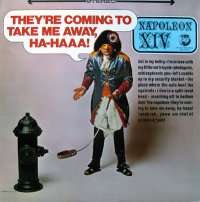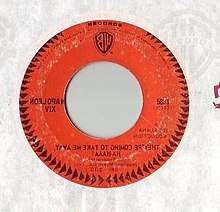They're Coming to Take Me Away, Ha-Haaa!
| "They're Coming to Take Me Away, Ha-Haaa!" | ||||
|---|---|---|---|---|
 Cover of the Rhino Records co. re-issue of the WB album | ||||
| Single by Napoleon XIV | ||||
| B-side | "!aaaH-aH ,yawA eM ekaT oT gnimoC er'yehT" | |||
| Released | July 1966 | |||
| Format | 7-inch single | |||
| Recorded | 1966 | |||
| Genre | Novelty, comedy | |||
| Length | 2:10 | |||
| Label | Warner Bros. #5831 | |||
| Songwriter(s) | N. Bonaparte (Jerry Samuels) | |||
| Producer(s) | A Jepalana Production | |||
| Napoleon XIV singles chronology | ||||
| ||||
| B-side | ||||
 Label of the original 7-inch issue | ||||
They're Coming to Take Me Away, Ha-Haaa! is a 1966 novelty record written and performed by Jerry Samuels (billed as Napoleon XIV), and released on Warner Bros. Records. The song became an instant success in the United States, peaking at No. 3 on the Billboard Hot 100 popular music singles chart on August 13[1] number 2 in Canada, and reaching No. 4 on the UK Singles Chart.[2]
Background
Jerry Samuels was a recording engineer at Associated Recording Studios in New York at the time when the song was written. He had learned a way to alter the pitch of a track using a potentiometer (a tape speed control). After recording the drum track at the standard speed, he played it back through headphones while recording the voiceover. As he did this, he gradually reduced the tape speed and slowly returned it to normal speed while reciting the lyrics in time with the relative speed of the drum track. This gave him the idea for a song based on the rhythm of the old Scottish tune "The Campbells Are Coming".
Story
The lyrics describe the effect on the mental health of an individual after a break-up. His paranoid thinking makes him believe that he is about to be transported to the "funny farm" (referring to a mental hospital), and he welcomes them as an end to his misery. The main character seems to be addressing an ex-girlfriend or wife, and describes his descent into madness after she has left him. However, the last verse of the song finishes: "They'll find you yet and when they do, they'll put you in the ASPCA, you mangy mutt" implying that the singer is actually referring to a runaway dog.[3]
Record structure
The recording is set primarily to a rhythm tapped on a snare drum and tambourine. The performer speaks rhythmically rather than singing the lyric, with the sparse percussion track being supported a siren sounding in and out of the "chorus" and the fading in and out of a tape-based echo created with an Echoplex. According to Samuels, the vocal glissando was achieved by Samuels' manipulating tape recording speeds, a variation on the technique used by Ross Bagdasarian in creating the original Chipmunks novelty songs.[4] In addition, a siren is heard when the voice gets higher, and then, dissipates when it's back to the regular voice.
Continuing the theme of insanity, the flip or B-side of the single was simply the A-side played in reverse, and given the title "!aaaH-aH ,yawA eM ekaT oT gnimoC er'yehT" (or "Ha-Haaa! Away, Me Take to Coming They're") and the performer billed as "XIV NAPOLEON". Most of the label affixed to the B-side was a mirror image of the front label (as opposed to simply being spelled backward), including the letters in the "WB" shield logo. Only the label name, disclaimer, and record and recording master numbers were kept frontward. The reverse version of the song is not included on the original Warner Bros. album, although the title is shown on the front cover, whereas the title is actually spelled backward.[5]
Warner Bros. Records reissued the original single (#7726) in 1973. It entered the Billboard Hot 100 at number 87. The reissue featured the "Burbank/palm trees" label. As with the original release, the labels for the reissue's B-side also included mirror-imaged print except for the disclaimer, record catalog, and track master numbers. The "Burbank" motto at the top of the label was also kept frontward as well as the "WB" letters in the shield logo, which had been printed in reverse on the originals.[6]
In his Book of Rock Lists, rock music critic Dave Marsh calls the recording the "...most obnoxious song ever to appear in a jukebox", saying the recording once "cleared out a diner of forty patrons in three minutes flat."[7]
Airplay
"They're Coming to Take Me Away, Ha-Haaa!" has the distinction of being the song to drop the farthest within the Top 40 in a single week.
Chart history
| Chart (1966) | Peak position |
|---|---|
| Australia (Kent Music Report)[8] | 40 |
| Canada RPM Top Singles[9] | 2 |
| UK [10] | 4 |
| U.S. Billboard Hot 100 [11] | 3 |
| U.S. Cash Box Top 100[12] | 1 |
Sequels
"I'm Happy They Took You Away, Ha-Haaa!" was recorded by CBS Radio Mystery Theater cast member Bryna Raeburn, credited as "Josephine XV", and was the closing track on Side Two of the 1966 Warner Bros. album. (Josephine was the name of the spouse of the French Emperor Napoleon Bonaparte.)
An artist named Josephine (whose real name is unknown) recorded her own response song, called “They Took You Away (I'm Glad, I'm Glad)“ in 1966.
A variation of "They're Coming to Take Me Away, Ha-Haaa!" was also done by Jerry Samuels, from that same album entitled Where the Nuts hunt the Squirrels, where Samuels, towards the end of the track, repeats the line: "THEY'RE TRYING TO DRIVE ME SANE!!! HA HA," before the song's fade, in a fast-tracked higher voice.[13]
In 1966, KRLA DJ "Emperor Bob" Hudson recorded a similarly styled song titled I'm Normal, including the lines "They came and took my brother away/The men in white picked him up yesterday/But they'll never come take me away, 'cos I'm O.K./I'm normal." Another line in the song was: "I eat my peas with a tuning fork." The record was credited simply to "The Emperor."[14]
In 1988, Samuels wrote and recorded "They're Coming To Get Me Again, Ha Haaa!", a sequel to the original record. It was included on a single two years later on the Collectables label. Recorded with the same beat as the original, and portraying Napoleon XIV relapsing to madness after being released from an insane asylum, it never charted, and was combined with the original 1966 recording on side A. (Both sequels are included on Samuels' 1996 Second Coming album.) In the song, instead of a "mangy mutt," for his lost dog, Napoleon bemoans the loss of his pet monkey. ("I'll swing you by your tail, you hairy ape!") In the song, instead of the "funny farm" and the "happy home" Napoleon XIV is being taken away to the "loony bin" and the "rubber room." Towards the end of the song, he relapses into the "funny farm" and "happy home"—until when reality sinks in, he cries out at a fast tracked double voice with the words: "OH NO!!!" before the beat ends with a door slam, indicating that he has been locked up in the insane asylum.[15]
The recording appeared on disk releases by Dr. Demento in 1975 as part of Dr. Demento's Delights,[16][17] then in subsequent Dr. Demento LP records released in 1985, 1988 and 1991.
Cover versions
Kim Fowley released a cover of the song as his second single, after "The Trip".[18][19]
In the UK a cover version was also released in November 1966 by the humorous pop group The Barron Knights where it was included on the B-side of their single "Under New Management".[20]
The Monkees' song "Gonna Buy Me a Dog", sung by Micky Dolenz, features Davy Jones teasing Dolenz toward the fade of the song with the words "they're coming to take us away" taken from Napoleon XIV's song.
In Argentina Pedro Pelusa Suero (a well known actor, announcer, and voice over) recorded, as "Napoleón Puppy", a cover in Spanish of this song titled "Ellos me quieren llevar".[21]
Jeff Duff, as "Cyril Trotts", covered "They're Coming To Take Me Away, Ha! Ha!" in 1984 on his To Bogna LP.
Experimental music band Nurse With Wound used some of the lyrics from the song for their limited 7" release "No Hiding from the Blackbird/Burial Of The Sardine".
Biz Markie also covers this song on Make the Music with Your Mouth, Biz, but he changes most of the lyrics.
Jello Biafra covered this song with his band Lard on their album The Last Temptation of Reid in 1990.
In 1998, Amanda Lear included this song in her compilation Made in Blood & Honey.
The song is referenced in the lyrics of the Mudvayne song "Internal Primates Forever" on L.D. 50.
Stone Sour also covered this song on their 2001 demo CD, giving it the name "Death Dance of the Frog Fish", and has also used it as exit music while on tour.
Swedish death industrialists Brighter Death Now included a version of the song on their 2005 recording Kamikaze Kabaret.
German industrial/EBM act Neuroticfish covered the song on Gelb in 2005.
A new version by Napoleon's Ghost was produced by Les Fradkin in 2006. The flip or B-side of the single was recreated as well by Napoleon's Ghost "!AaaH-aH ,yawA eM ekaT oT gnimoC er'yehT".
Ray Stevens covered the song in 2012 for his nine-CD Encyclopedia of Recorded Comedy Music collection, complete with vocal speed changes, a drum beat, sirens, and a funny sped-up laugh.
Butcher Babies covered the song on their EP Uncovered in 2014.
The 2018 Kanye West and Kid Cudi collaboration "Fire," released under their collaboration name Kids See Ghosts, samples the percussion intro of the recording.
Austen Tayshus covered the song on his 1988 album Whispering Joke and also as a single. The B-side (a reversed version) was recreated as well.
References
- ↑ Joel Whitburn, The Billboard Book of Top 40 Hits, Billboard Publications, 1983.
- ↑ Joel Whitburn's Top Pop Singles 1955-1990 - ISBN 0-89820-089-X
- ↑ Richard Crouse (26 April 2000). Big Bang, Baby: Rock Trivia. Dundurn. pp. 91–. ISBN 978-0-88882-219-2.
- ↑ Richard Crouse (15 March 2012). Who Wrote The Book Of Love?. Doubleday Canada. pp. 72–. ISBN 978-0-385-67442-3.
- ↑ Paul Simpson (2003). The Rough Guide to Cult Pop. Rough Guides. pp. 23–. ISBN 978-1-84353-229-3.
- ↑ Ace Collins (1998). Disco Duck and Other Adventures in Novelty Music. Berkley Boulevard Books. pp. 210–211. ISBN 978-0-425-16358-0.
- ↑ Marsh, Dave; Stein, Kevin (1981). The Book of Rock Lists. Dell Publishing. p. 80. ISBN 978-0-440-57580-1.
- ↑ Go-Set National Top 40, 5 October 1966
- ↑ "Item Display - RPM - Library and Archives Canada". Collectionscanada.gc.ca. 1966-08-15. Retrieved 2018-08-16.
- ↑ "Official Charts Company". Officialcharts.com. 1966-08-10. Retrieved 2018-08-16.
- ↑ Joel Whitburn's Top Pop Singles 1955-1990 - ISBN 0-89820-089-X
- ↑ Cash Box Top 100 Singles, July 30, 1966
- ↑ "M-Audio Fast Track MKII USB Audio Interface". Guitar Center. 2011-12-29. Retrieved 2016-09-29.
- ↑ "Emperor Hudson". Kfxm.com. Retrieved 2016-09-29.
- ↑ "Door Slam Sound Effects, Door Slam Sounds, Door Slam Sound Effect, Door Slam Sound Clips". Sfxsource.com. Retrieved 2016-09-29.
- ↑ "Billboard's Recommended LPs". Nielsen Business Media, Inc. (15 November 1975). Billboard. Nielsen Business Media, Inc. pp. 72–. ISSN 0006-2510.
- ↑ Newsweek. Newsweek, Incorporated. October 1975. p. 86.
- ↑ Colin Larkin (27 May 2011). The Encyclopedia of Popular Music. Omnibus Press. pp. 2178–. ISBN 978-0-85712-595-8.
- ↑ "International news reports". Nielsen Business Media, Inc. (20 August 1966). Billboard. Nielsen Business Media, Inc. pp. 55–. ISSN 0006-2510.
- ↑ "The Barron-Knights – Under New Management". 45cat. Retrieved 5 September 2016.
- ↑ "Napoleon Puppy – Discography". Discogs. Retrieved 17 May 2018.